Filling others’ cups: A Q&A with James Beard-nominated chef Omar Anani of Saffron De Twah
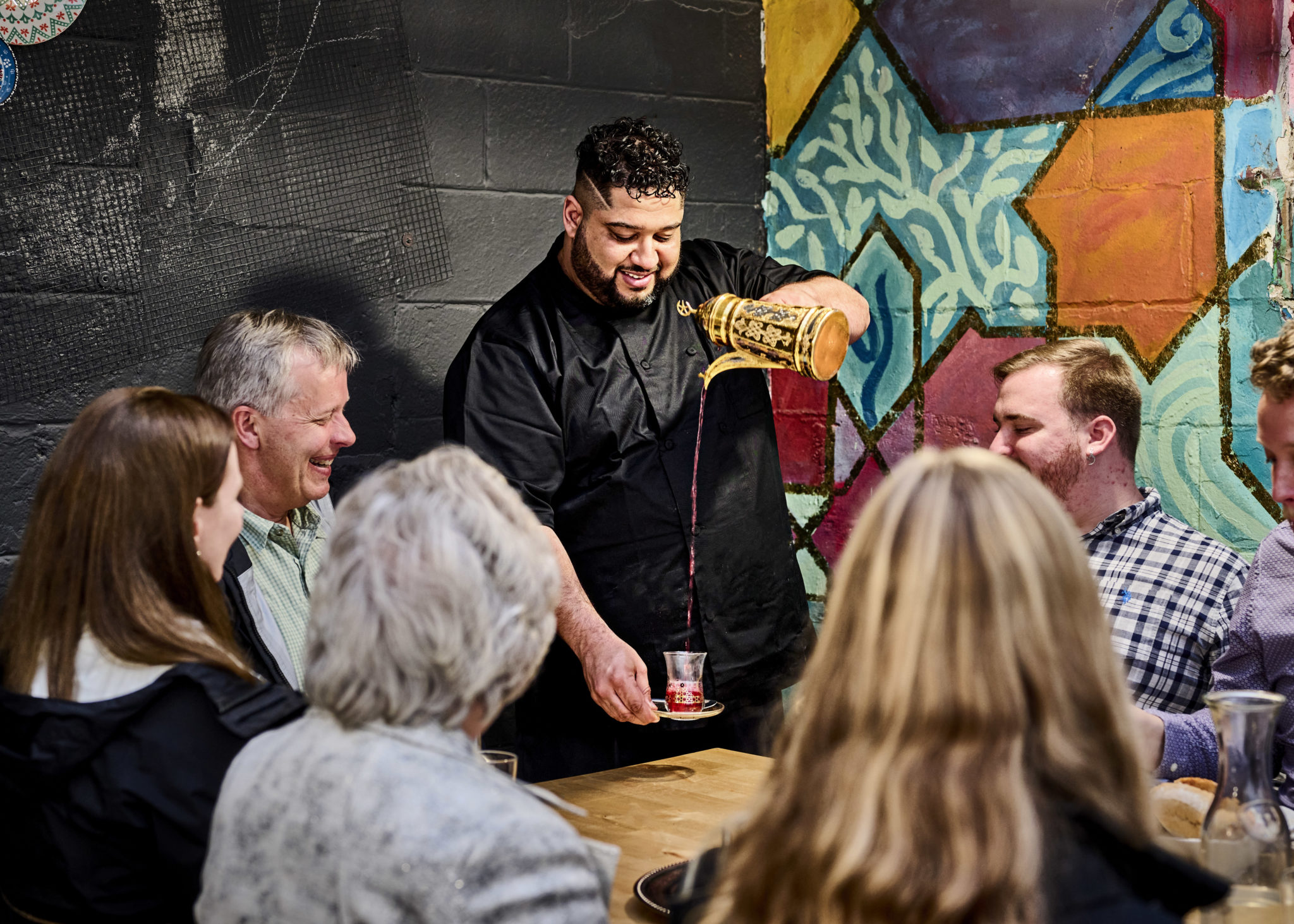
When Omar Anani opened his Moroccan-inspired restaurant Saffron De Twah in a former shrimp shack on Detroit’s east side in 2019, few could have guessed that the grease-stained little building attached to a cratered parking lot would become, in just a few short years, home to one of the city’s only chefs to make it through to the finalist round of the James Beard Foundation Awards.
(Sister Pie’s Lisa Ludwinski was a nominee for Outstanding Baker in 2019 and 2020, but Jimmy Schmidt’s win in 1993 with the Rattlesnake Club was the last time Detroit was represented in the regional Best Chef category.)
Saffron’s scruffy setting — now spiffed up with a vibey heated patio built atop freshly poured concrete, among other upgrades — couldn’t deter either critics or the community, both lured by Anani’s hands-on, whole-hearted approach to hospitality and commitment to making a positive change in the neighborhood and wider restaurant industry.
Anani secured his role as a local leader during the height of the COVID-19 pandemic, shutting down the restaurant to protect his staff and guests even before the government mandated it, and then turned Saffron De Twah into a community kitchen that provided thousands of free meals to people in need.
Through the restaurant, he’s introduced guests to Moroccan flavors largely missing from Detroit’s dining landscape, and also shares his own Palestinian-Egyptian culture with occasional pop-ups (including a Palestinian dinner party at Frame June 9.)
We recently caught up with the gregarious chef to talk about how the idea of sharing informs his work at Saffron De Twah.
This conversation has been lightly edited for brevity and clarity.
Frame Stories: You have a pretty clear mission at Saffron De Twah. Can you tell me about it?
Omar Anani: The mission is two things. One is to break barriers through food. The other is “hasan al diyafa.” It’s the Arabic word for hospitality. But if you literally translate it, it’s “hasan” — the good deeds one collects to get into the afterlife — and “al diyafa” — to give to your guests. So the term for hospitality is giving the good deeds that you need to get to the afterlife to your guests. If you think about what hospitality means in Arabic, our focus is on the people. That’s the guiding principle that we try to live by.
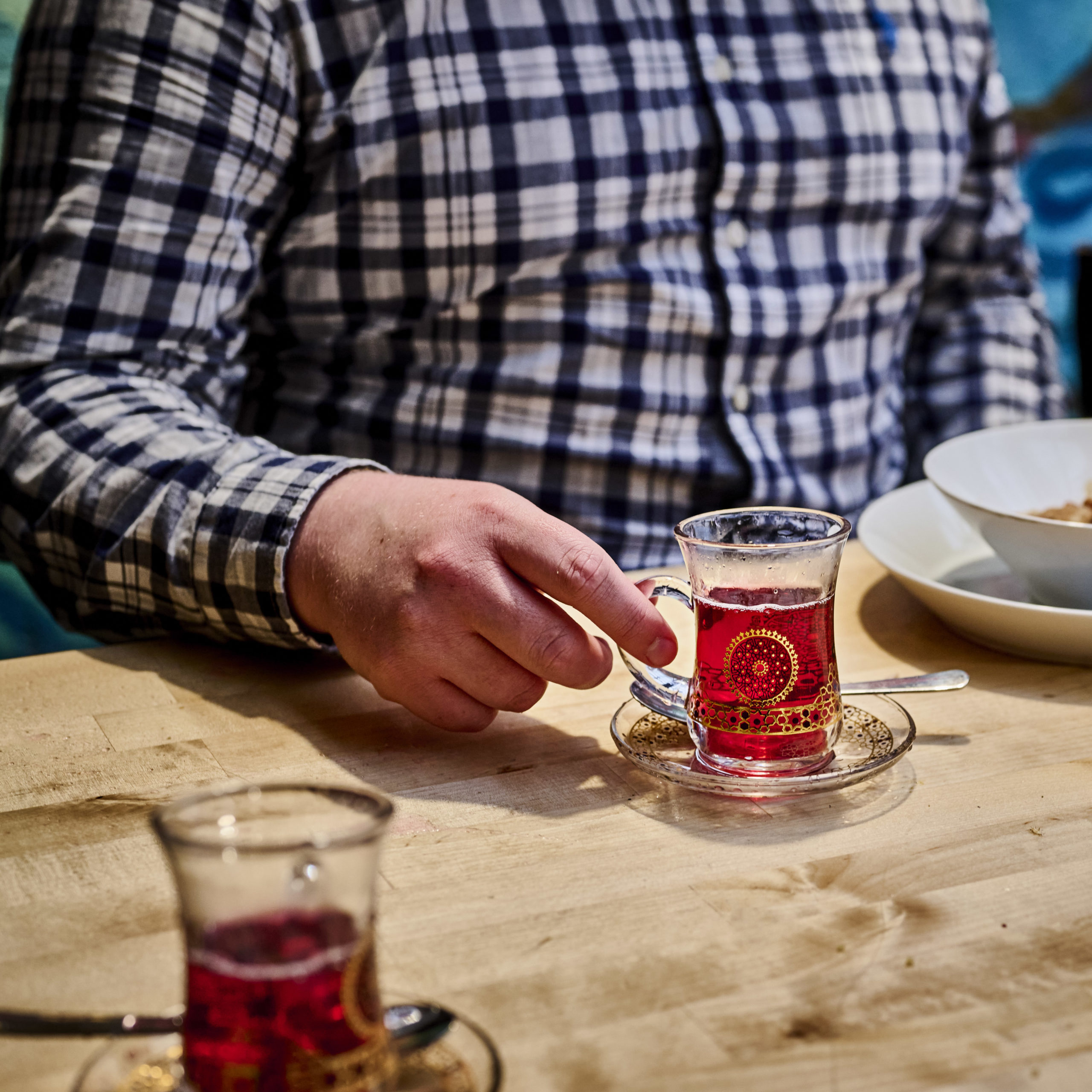
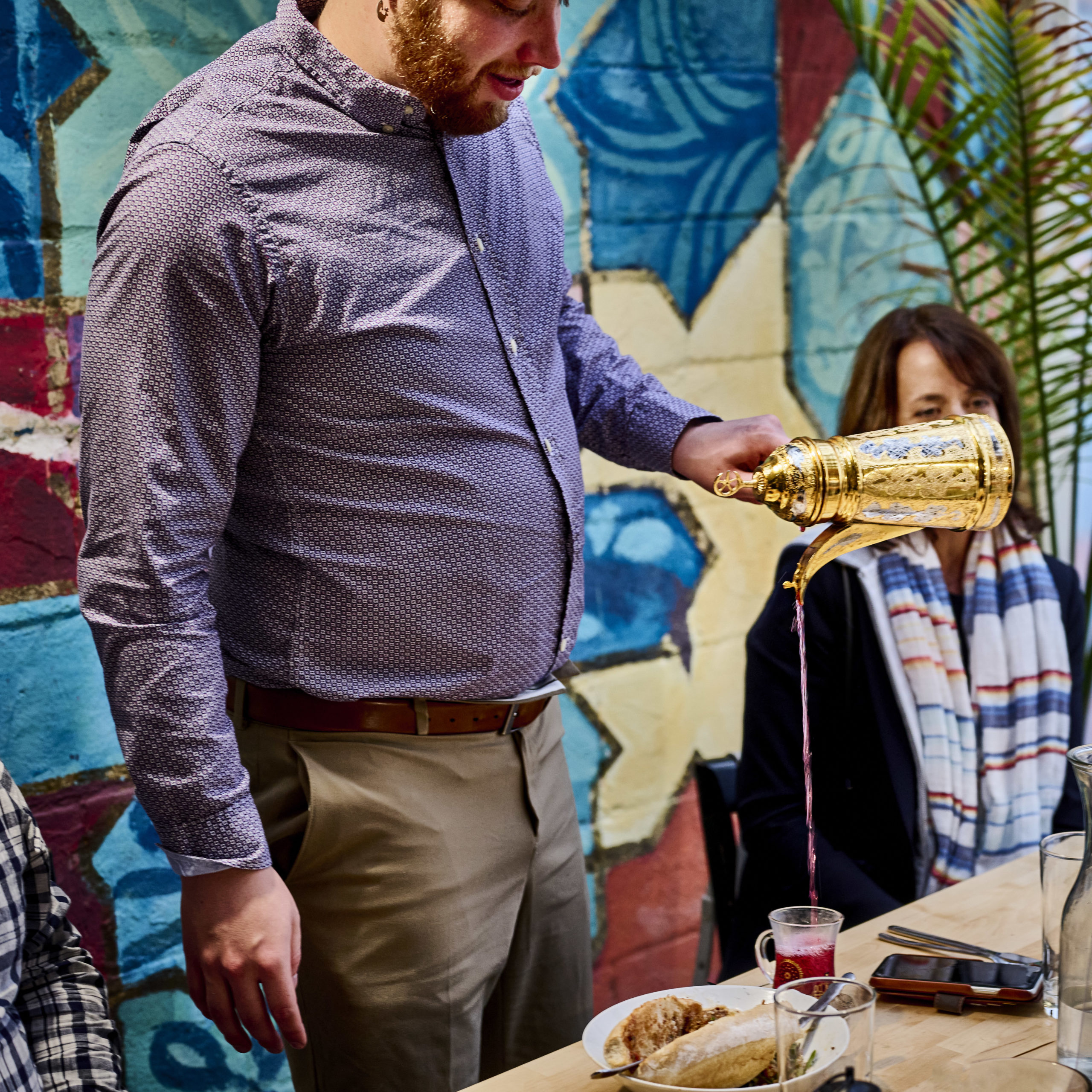
FS: What are some specific things you do in service of that mission?
OA: The mission happens in a number of ways. One is by humanizing a people through food. Most people, when they hear the word “Palestinian,” it’s like this gasp from not understanding. So how can we learn more about those people? Through their food. So doing a Palestinian pop-up is one way. The point is to bring people together. How do you take Muslims and the views people have of us and show them we’re not terrorists or all bad? Take all the community meals we did through the pandemic. The next time someone says, “All Muslims are terrorists or are bad,” maybe someone else will say, “Hey, there’s a Muslim guy up the street that gave 150,000 meals away during the pandemic.”
FS: What is it about food that makes it an appropriate vehicle for breaking through those cultural barriers?
OA: Food is the universal language. It doesn’t matter if you’re Black, white, Muslim, Christian, Jewish, atheist. It doesn’t matter. Even a dog understands food. We talk about fried chicken being from the South, but every country has figured out how to fry a bird and make it delicious. You have karaage in Japan, schnitzel in Europe. One of the coolest things is when somebody eats a dish I make and says, “This reminds of a dish we make in India,” for example, “and we call it this back home.” Food is really the introduction to a people and culture and helps you understand what people are about. Delicious food is delicious food. It doesn’t matter where you’re from.
FS: Tell me about some of the ways you share with the community around Saffron De Twah.
OA: There’s more than one community. There’s your religious community, your neighborhood, your peers — all these different definitions of community. Doing something specific for each community is really important. The community meals were really important during the pandemic. But now, it’s like, OK, what are we doing about sustainability? So we took a Make Food Not Waste pledge to become a zero waste kitchen. And we are in the hospitality community. How do we service those people? There’s a labor shortage for a reason. People were treated like crap for decades and now they’re like, “What are we doing?” We’ve taken a lot of initiatives to try and help. We have healthcare with dental and vision. We have PTO. We want people to take mental health breaks when they need it. We have paid maternity leave of eight weeks, which is unheard of for a small mom and pop.
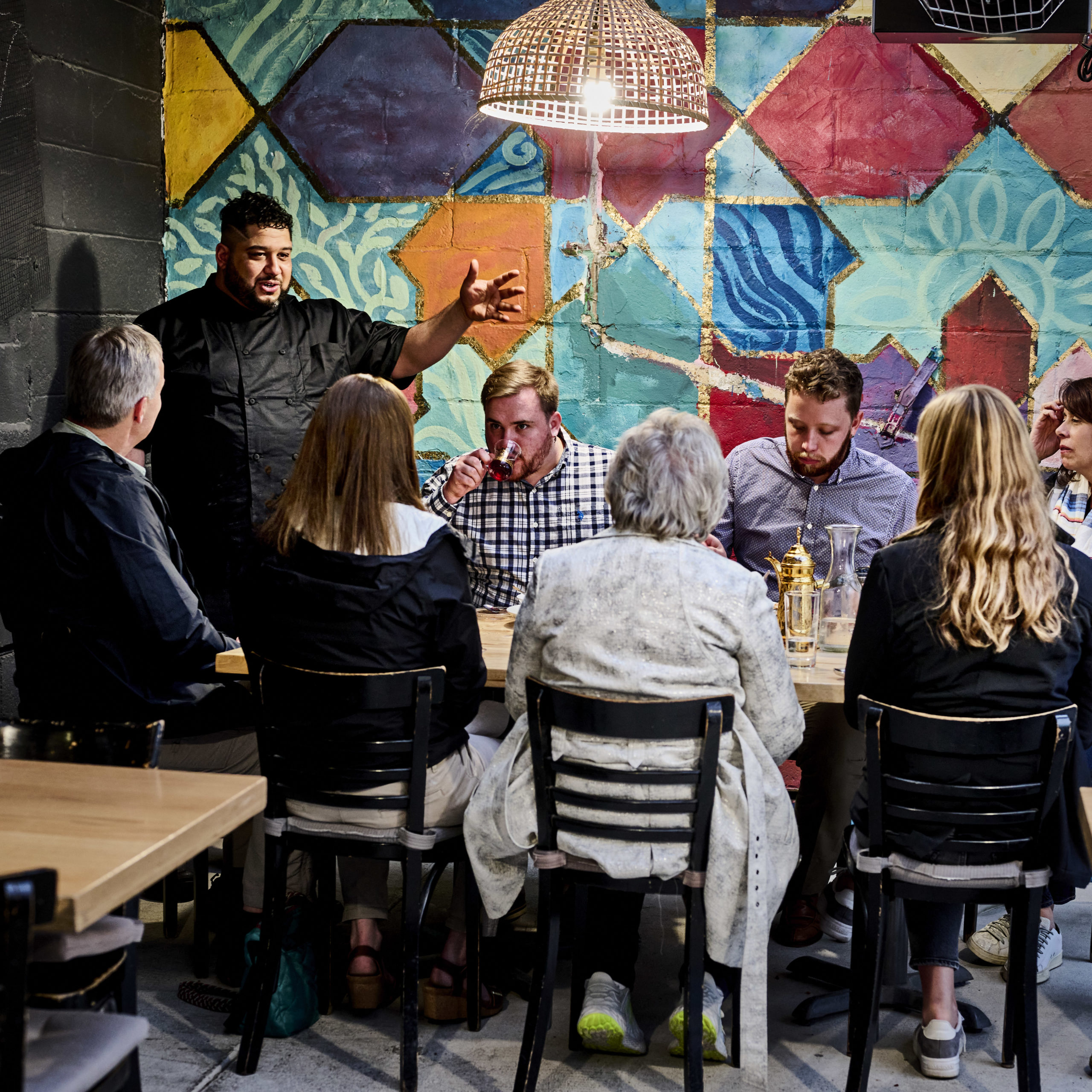
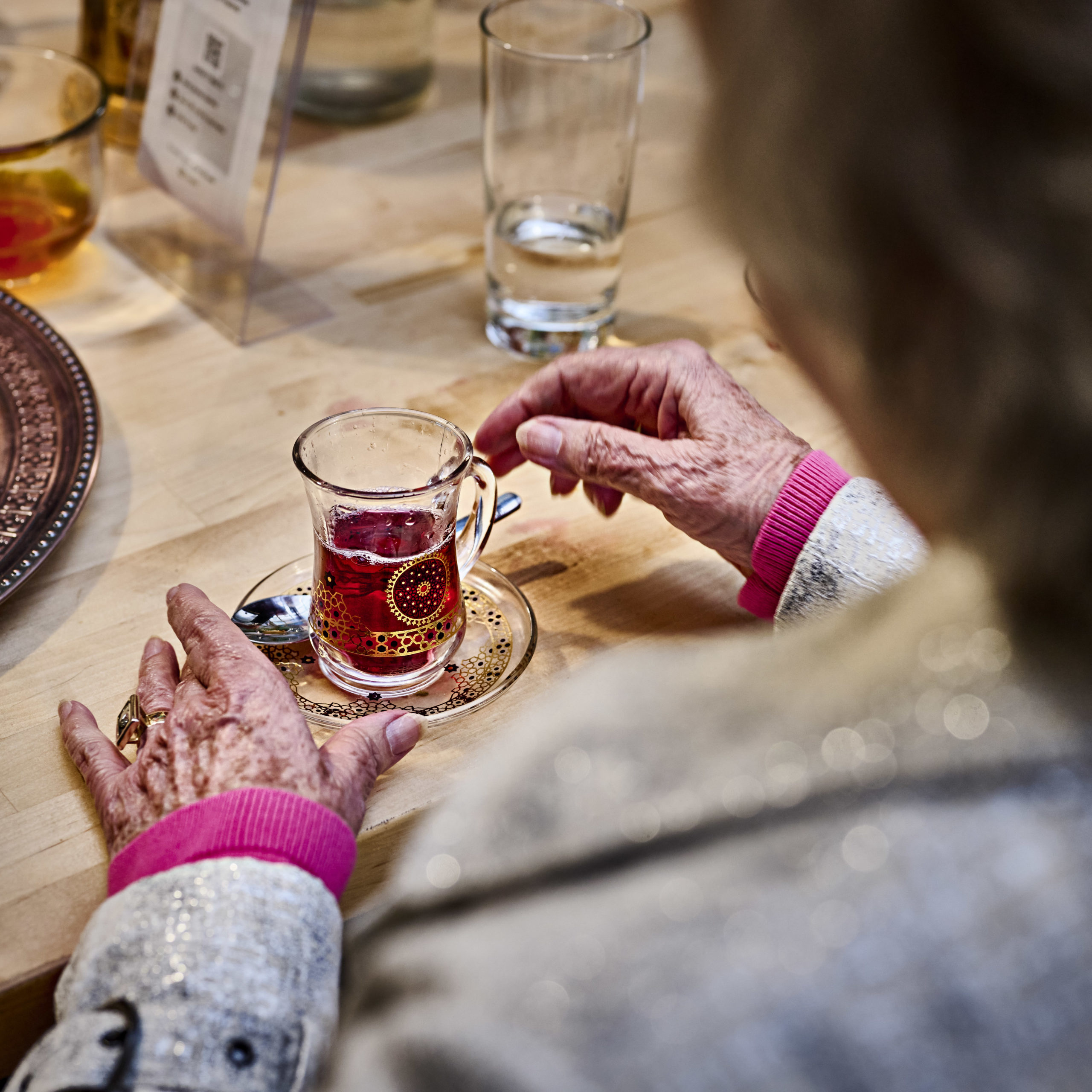
FS: That’s huge! Lack of healthcare is such a big issue, especially in the restaurant industry. Can you share how you’ve tackled that at Saffron?
OA: Originally, I knew we had to offer some form of healthcare but there were so many barriers. I don’t have enough employees or enough of this or that. So we went to brokers who do this for a living and can help you build a small program. The thought of the cost is overwhelming for most restaurateurs. So we started simply with Plum Health, which is direct care through Dr. Paul Thomas in Corktown. A lot of restaurants in Detroit use him. It allows people to have some sort of insurance. We did that for a while. But then I had people come to me like, “Chef, I really want to work for you, but I have a family and I need actual insurance.” So that’s when we put the pedal to the metal to find true, full healthcare. And at the time my wife was leaving her job and we needed healthcare, too. So what are we going to do? It was Courtney Burk who turned me onto this Health Choice of Michigan program. It comes through Wayne County and Oakland County. It’s completely built for small businesses. You only need two employees to sign up. Its full comprehensive coverage with dental. The cost is only $275 per month per employee. We were already paying $100 a month for direct healthcare, so we rolled that over to the insurance. And it’s like, “OK, I’ll cover $100 for you, so it’s only $175 a month.” If you have a family, the rates go up, but it’s still pretty affordable and with no deductibles.
FS: Can you talk about your long-term goal at Saffron to become worker-owned?
OA: In terms of food, I’ve always thought that I was destined to do more than just cook. That wasn’t what my life was meant to be. One of the hardest shifts to make is from chef to restaurant owner. You have to give your baby to someone else and let them raise it and give them the power so you can step away. The people we have at Saffron are so dedicated to the cause and what it means that they truly care about the restaurant as much as I do. It goes back to culture. I can’t ask them to sacrifice like that without giving them a piece of what’s going on. My job is to teach them how to run a restaurant. And if I do that, I become successful. I can’t wait to go into one of my cook’s restaurants later on in life and they can come up and say, “Hey, this is the chef that taught me everything I know.” That’s the greatest reward. It means more than a James Beard or a Michelin star or any award.
FS: How do you go about actually doing that?
OA: Saffron De Twah is very much a structured system in that everyone comes in at $15 an hour. I don’t care who you are or how good you are. Time and tenure is the most antiquated system on the face of the planet. You worked somewhere for a year so they give you a 3% raise but inflation is like 9%? That’s not a raise. For us, it’s a performance-driven experience. As soon as I can do the task that makes me $16 an hour, I deserve $16 an hour, whether it takes a week or a year to learn it. We have six tiers of training and it goes all the way to $18 an hour. Because we don’t do tipped wages — which, by the way, come from slavery — we now control the tips and get to divvy those up between everyone. The disparity between front-of-house and back-of-house doesn’t exist in our restaurant. We don’t use those terms. It’s one team and one mission: to focus on the guest. The dishwasher is getting tips. The cooks are getting tips. And they’re averaging an extra $5 or $6 an hour just in tips.
We also do open accounting. We kicked a vendor out of the restaurant about a month ago because one of my cooks caught that we had paid $15 for a pound of jalapeños. And I said, “That’s normal. We usually pay $15 for jalapeños.” And that’s true, but we usually get five pounds. So many cooks think their restaurant owners are making millions, but it’s a game of pennies. If the cooks don’t know the pennies, they can’t look out for your business. That was a cook looking out for those pennies and caring about the business. It comes down to training. The more you can train your people on how a restaurant works, the better your restaurant will be.
FS: How else does sharing play into your business and life?
OA: I think when people talk about sharing, intrinsically as people, we ask the question: “What’s in it for me?” And sometimes it’s not about what’s in it for you. Sometimes it’s about filling other people’s cups. Of course, you can’t fill others’ unless yours is full, but having the ability to fill other people’s cups is the most rewarding thing on the planet. They say people who truly have hospitality ingrained in them, a lot of times they run their restaurants in the ground, because they will give their shirts off their backs to others. That’s just the way we’re built. It’s just about others and making them happy. But for people who are really really good at it, it bleeds into all aspects of their lives. They give to their community and their religious organization, whether it’s a church or a mosque. I used to be of the mindset that I would never give a homeless person money because I don’t know where it’s going to go, but I will always give them a meal. And last time we were in Egypt, my mom gave so much money to a lot of people in need. My mom is so giving. She doesn’t even ask. She just has this compassion and there’s no boundary of giving. I think I learned from her that I gain so much more from giving. That concept of giving — that’s what life is all about for me.















